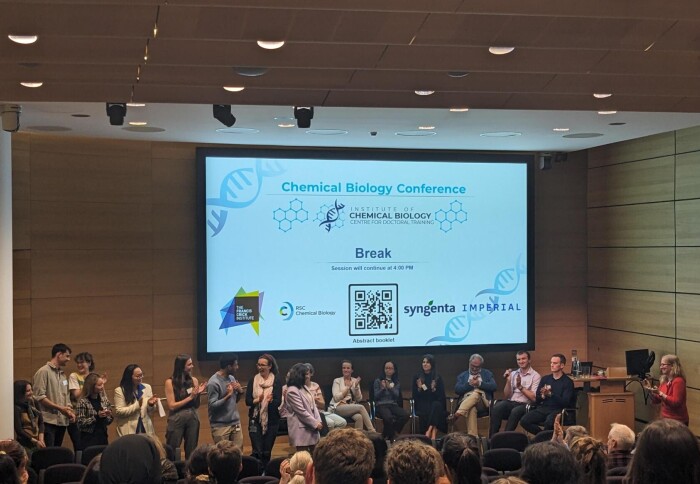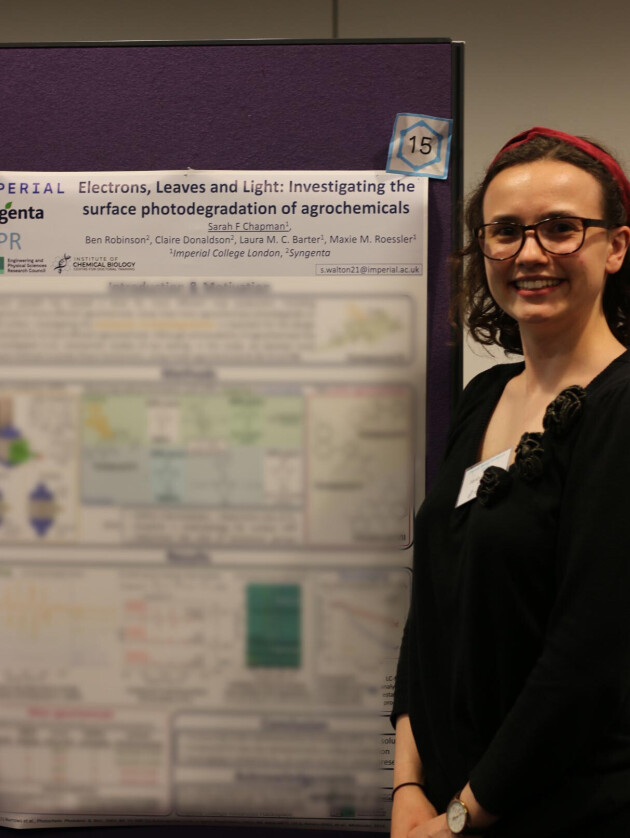ICB CDT Student-Led Conference 2024

Conference stage full of speakers and students!
The ICB CDT social media committee took a closer look behind the scenes at our ICB student-led conference.
During the second year of their PhD, the ICB students get the opportunity to design and run their own conference. This exciting day brings together students, postdoctoral researchers and group leaders from the Institute of Chemical Biology. This year, topics included nucleic acid biology, lab-on-chip devices, biophysics and glycobiology delivered by world leaders from across the globe and was hosted at The Francis Crick Institute.
On Tuesday, July 9th at the prestigious Francis Crick Institute in London, this student-led event was a dynamic platform for fostering knowledge exchange and collaboration within the field of chemical biology.
The organising committee put together an excellent programme line-up, featuring Hagan Bayley (University of Oxford), Ysobel Baker (University of Southampton), Shery Huang (Cambridge University), Marthe Walvoort (University of Groningen) and Michael Booth (UCL), and well as two PDRAs from Imperial, Devkee Vadukul and Janine Gray! The event culminated in a panel discussion focusing on careers for chemical biology graduates, and the fabulous speakers were joined by Samuel Hart, Patent Attorney at Mewburn Ellis LLP, and ICB CDT graduates Chiara Heide, CEO, and founder of P.Happi/B.Y.M. Technologies and Jonathan Rains, Principal Physical Chemist, Syngenta.
We had an insightful conversation with Sarah Chapman, the treasurer of the organising committee of the ICB CDT student-led Conference, in the run-up to the event.
As a student organizer, what were you most excited about for the conference?
I have been excited to see how it feels to be at the other end of the conference! It’s been pretty cool to be in a position of emailing big companies to ask them for sponsorship and having them be generous enough to actually sponsor us: it shows that we really have something worth attending!
What do you expect to achieve and how will the conference benefit the targeted audience?
A fully functioning conference (as far as any conference is fully functioning, at least)!
We tried to organise a conference that targets subjects at the forefront of technological developments in chemical biology, whilst also keeping in mind that some people attending the conference may be more interested in the type of research that goes on outside of academia. Hagan Bayley as our keynote speaker is perfect to demonstrate this, since he has made a name for himself as an academic and principle investigator, but also has had his own experience of founding the spinout company Oxford Nanopore – I’m certainly interested in hearing what he has to say in the panel discussion about that.
Beyond the talks, are there any interactive workshops, networking opportunities, or social events planned for the conference?
We’ve got you covered! We planned a judged poster session, so poster presenters could have discussions about their own research with academics and industry partners. We also had a panel discussion at the end of the day, where the audience could ask experts questions regarding their career paths. There were industry sponsors at the event with stands so that we could make the most of networking during the coffee/tea and lunchbreaks.

We’ve tried to organise a conference that targets subjects at the forefront of technological developments in chemical biology, whilst also keeping in mind that some people attending the conference may be more interested in the type of research that goes on outside of academia. Sarah Chapman, Second year PhD Candidate
Article text (excluding photos or graphics) © Imperial College London.
Photos and graphics subject to third party copyright used with permission or © Imperial College London.
Reporter
Press Office
Communications and Public Affairs
- Email: press.office@imperial.ac.uk
